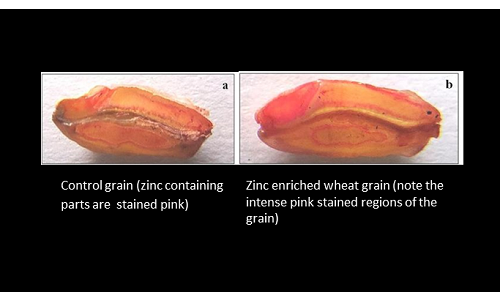Indian scientists develop a zinc-nanofertiliser which can enhance nutritional quality of wheat by increasing its zinc content. Agronomic fortification of food grains could be used to compensate micronutrient levels in grains but it leads to nutrient wastage as well as environmental pollution resulting from excessive use of minerals and fertilizers.
Pune (ISW): Micronutrient deficiency is a major challenge in India. Agronomic fortification of food grains could be used to compensate micronutrient levels in grains but it leads to nutrient wastage as well as environmental pollution resulting from excessive use of minerals and fertilizers. Now scientists at the Agharkar Research Institute in Pune have shown that using nanofertilizers in right doses can enhance nutritional quality of wheat by increasing its zinc content.
Wheat is one of the most widely consumed staple foods. But people consuming wheat without inclusion of pulses, green leafy vegetables, nuts, meat, eggs and animal-derived food are prone to zinc deficiency. The is because wheat has low zinc content and the presence of phytates in wheat make zinc less bioavailable.
Majority of Indian soils are zinc deficient and soil zinc application is highly recommended along with application of NPK fertilizer. Provision of macronutrient fertilizer increases the yield, but results in the dilution of the micronutrient. Conventional biofortification of wheat with zinc- containing fertilizers in high doses needs good drainage, favorable pH (slightly acidic to neutral), and adequate organic content.
To address these problems, researchers have developed zinc-nanofertilizer (Zn-CNP – Zinc Chitosan Nanoparticles) spray. The nano formulation contains zinc complexed with a biopolymer – chitosan and is applied to leaves at the grain filling stages.
In the study, two durum wheat cultivars – MACS 3125 (high yielding) and UC1114 (with high grain protein) – were used to test the efficacy of the formulation. The four-year field trial data showed that this wheat variety exhibited approximately 36% zinc enrichment upon application of the nanofertilizer. MACS 3125 wheat variety is suitable for cultivation in central and peninsular India.
“The use of Zn – CNP reduced the fertilizer requirement up to eightfold than the conventional zinc sulphate containing fertilizer. The increased zinc content in the grain improved its protein content and other micronutrients like iron and manganese,” Dr Jyutika Rajwade, who headed the research team said.
Despite increased grain zinc content the yield of wheat remained unaffected for MACS 3125 variety. This means leaf-applied zinc indeed reaches the grain. UC1114 (with high grain protein) variety showed significantly high zinc, protein and iron content but exhibited a late flowering as compared with MACS 3125.
Dr. Rajwade said, “our work defines a new paradigm in micronutrient application – use nano-fertilizers at the right place, right time and in right doses. Grain zinc enrichment not only improves nutritional quality benefitting the consumers but also the farmer, who gets an improved crop-stand in the next cropping cycle. Deployment of such systems for delivery of other nutrients and across other crops is indeed possible.”
The research study was published in the journal Scientific Reports.


